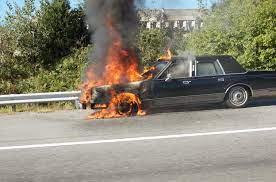A total of 3000 cars caught fire on the ship, but where did the fire start?
The ship was 199m long and started on the ship while it was on route from Germany to Egypt. It caught fire off the coast of Holland. Of the 3000 cars, 350 of the cars are Mercedes and 25 were electric.
The fire has not been good, and one person has died as a result. However, what is clear is that a large number of media sources have blamed the electric cars before anyone has worked out what is happening.

Below are a list of the most common causes of cars catching fire.
- Severe engine oil leaks that cause the engine to lose so much oil, it no longer has a safe amount and overheats.
- Forgetting flammable materials under the hood, like rags or paper towels used for cleaning, is a serious danger.
- Overheated brakes can cause tires and brake pads to catch fire.
- Lack of maintenance can cause rubber hoses and seals to wear out and leak flammable liquids.
- Modifications can be dangerous. Cheap parts or careless labor can result in disaster.
Coming from a different angle, lets look at the UK as an example.
Every year in the UK, over 100,000 cars which equates to nearly 300 a day go up in flames and around 100 people die as a result. Around 65% of these fires are started deliberately to cover criminal activity, to make a fraudulent insurance claim or as an act of vandalism.
A different statistic complied by “what car”
A more recent report conducted by Health and Safety organisation CE Safety found that there have been 753 callouts to EV fires in the UK over the past five years. This total includes all types of electric vehicle, including e-scooters and e-bikes, with electric cars representing 44%.
Now, taking these numbers as a rough starting point, 35% of 100,000 is 35,000, or near enough 1 a day. Scaling this up to 5 years, this is 175,000 car fires, that are not started on purpose.
In the same time 753 EV fires have need help putting out, however, only 44% of these or 331 were actual cars (the rest bikes and others).
So, over the last 5 years, there have been roughly 175,000 car fires not started deliberately, and from these 331 were electric cars – 0.18%. Currently electric cars make up roughly 3.1% of cars in the UK, so they are burning at 1/17 the rate that combustion engine cars.
So what does this mean? Well, firstly, the most obvious result is that you are far less likely to have a fire in an electric car than you are in a combustion engine car – and it also stands to reason that as the proportion of electric cars increases, the number of car fires should reduce. In 2019 the London Fire Brigade tackled 54 fires in EVs, compared to 1,898 in petrol and diesel cars. Now it is true that once on fire, it is usually harder to put an electric car out – there is a reason that the lithium is kept away from air, but there is usually plenty of time to get out of an electric car after a crash, before it catches fire.











